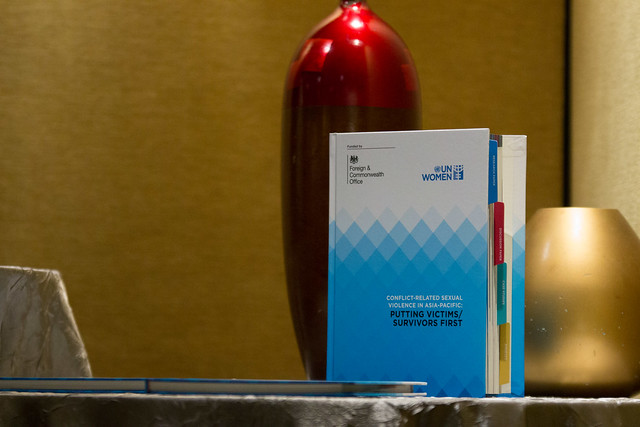Needs of victims/survivors of conflict-related sexual violence and their children in the region require urgent attention and response
Date:

[Joint Press Release]
Bangkok, Thailand — Armed conflicts, civil unrest and internal crises have created ongoing challenges for the protection of women and girls across Asia and the Pacific. They are among the most vulnerable and their rights have been violated, including through sexual violence.
Often the victims and survivors of sexual violence and their children are forgotten about and their specific needs are not addressed.
Today, UN Women, with support from the British Government, are releasing a report aimed at tackling this, drawing attention to the problem, and giving recommendations to support survivors of sexual violence in conflict.
The report, “Conflict-related Sexual Violence in Asia-Pacific: Putting Victims/Survivors First” addresses the needs of conflict-related sexual violence victims and their children and provides innovative solutions.
The UN Women study documents that, during some periods of conflict, sexual violence against women has been devastatingly pervasive. Women have been captured and abused while in detention, and many have been subjected to repeated rape and ‘forced marriages’ with soldiers or militia.
Despite a growing demand to hold perpetrators accountable for their actions, less recognition has been given to the health, psycho-social and economic needs of victims, survivors and their children, including those born of rape in conflict.
The report recommends that women, especially those subjected to conflict-related sexual violence, need access to sustainable livelihoods, legal rights to inheritance, and to own land and resources in order to address the economic impact of these violations.
The British Embassy Bangkok’s Deputy Head of Mission, Margaret Tongue, said,
“The British government is proud to have supported UN Women in its work on this innovative report - as a key part of our global effort to eliminate sexual violence in conflict. In addressing these issues it is vital to maintain a focus on the victims and survivors of sexual conflict, keeping them at the heart of the policy approach and recognising their wider needs.”
Hanny Cueva-Beteta, UN Women’s Regional Advisor on Governance, Peace and Security noted the report’s finding that National Action Plans on women, peace and security in Asia have rarely addressed the needs of victims of sexual violence in conflict,
“None have tackled inheritance and land rights, which are key issues for victim/survivor economic empowerment and the sustainable livelihoods for them and their children. This needs to be addressed.”
Featuring an independent research paper, policy analysis, and case studies from Nepal and Sri Lanka, the publication is the first of its kind. It aims to understand the practical and strategic needs of conflict-related sexual violence survivors and their children better, and to identify priorities for action.
Photo Gallery
Notes For Editors
Drawing from experiences in Nepal, Indonesia, the Philippines, Timor-Leste, Sri Lanka and Myanmar, the publication makes recommendations for strengthening national approaches that respond to survivors, including through National Action Plans on Women, Peace and Security. The research recommends increased focus on meeting the basic survival and income needs of survivors and their children and providing for health, psychosocial, legal and protection needs to all be addressed.
Dr. Aisling Swaine, formerly of George Washington University, and soon to join the London School of Economics Centre for Women, Peace and Security, contributed an independent research paper to the report that made a number of striking findings. Dr. Swaine’s study of the National Action Plans from Indonesia, the Philippines, Timor-Leste and Nepal found that:
- the situation of children born to women that have experienced sexual violence in conflict is overlooked and responses to their needs are not included in any of the National Action Plans;
- none of these plans address inheritance and land rights, which are key economic issues for many conflict-related sexual violence survivors;
- of actions addressing the service provision needs of survivors only 10% were linked to addressing their health needs.
As part of the project, two Expert Group Meetings hosted in Bangkok in January 2017 and in Kathmandu in February 2017 were held to reflect the needs, concerns and voices of conflict-affected women from across the region.
In July 2016, UN Women and the Government of Japan hosted an Asia-Pacific Regional Symposium on the National Action Plans (NAPs) on Women, Peace and Security (WPS) in Bangkok with over 80 participants from 17 countries to examine the successes and challenges of NAPs-WPS in Asia-Pacific to date. Following the successful symposium, the UK funded this follow up project as part of the wider UK-Japan cooperation on gender in security and conflict.
Media inquiries
UN Women:
Montira Narkvichien, Regional Communications Specialist
Email: [ Click to reveal ]
Twitter/Facebook @unwomenasia
Web http://asiapacific.unwomen.org
British Embassy Bangkok:
Daniel Fieller, Second Secretary Political
Email: [ Click to reveal ]
Twitter @UKinThailand
Web http://www.gov.uk/world/thailand
Facebook facebook.com/ukinthailand
About UN Women
UN Women is the United Nations organization dedicated to gender equality and the empowerment of women. A global champion for women and girls, the organization was established in 2010 to accelerate progress on women’s rights worldwide. UN Women’s efforts are based on the fundamental belief that every woman has the right to live a life free from violence, poverty, and discrimination, and that gender equality is a prerequisite to achieving global development.
